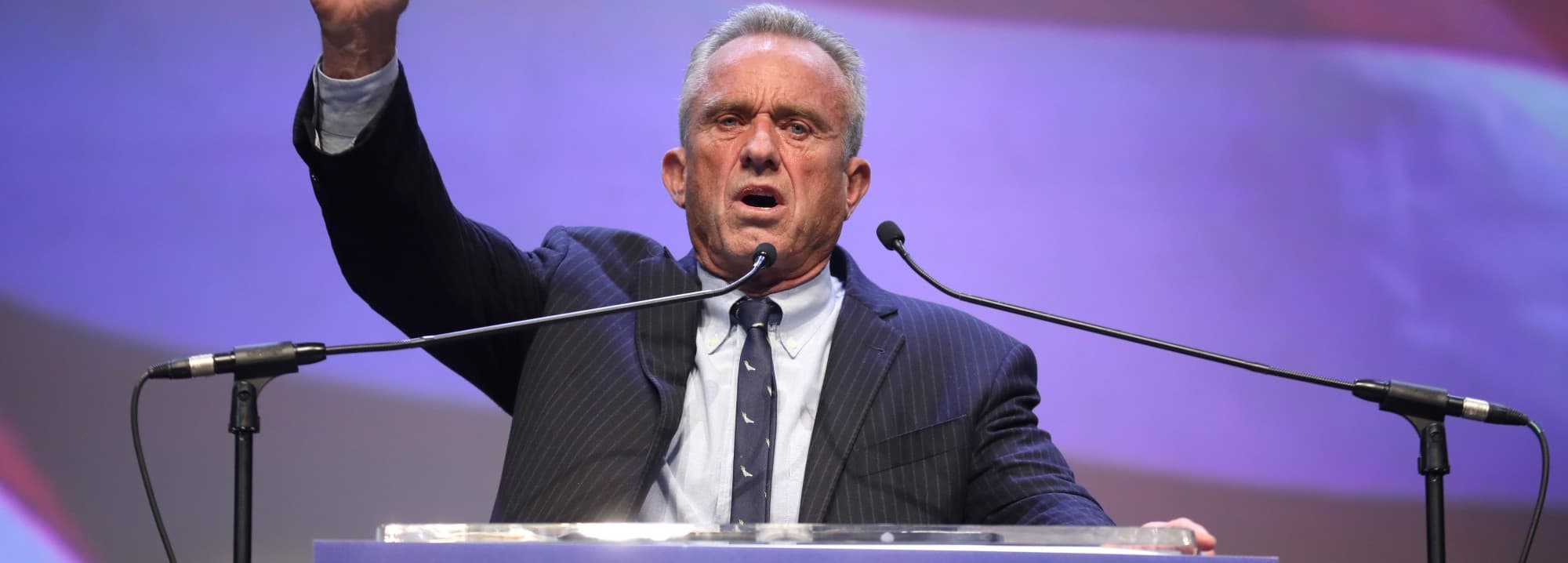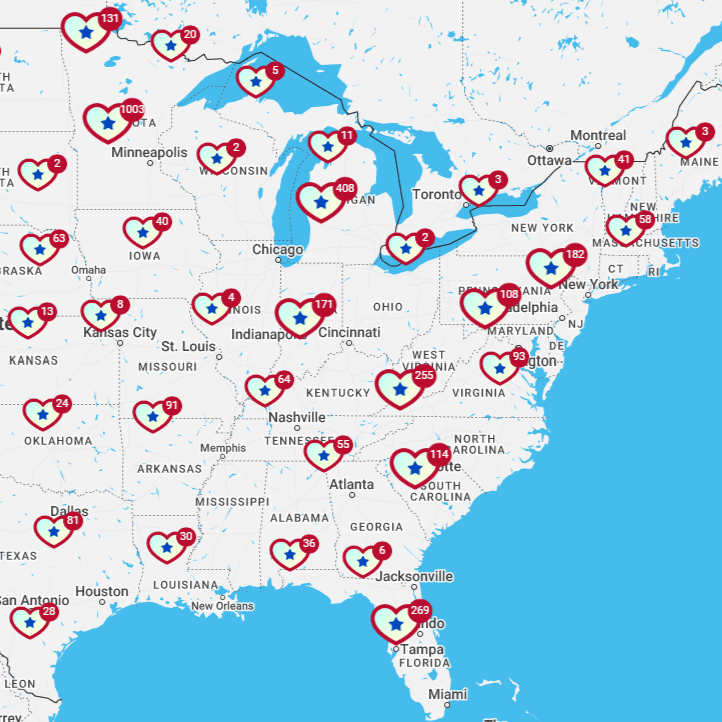
Robert F. Kennedy, Jr.'s Place in the Independent Movement
"Instead of two parties we have this kind of uniparty, a two-headed monster that's constantly bickering with itself as it leads us all over a cliff." ~ Robert F. Kennedy, Jr. announcing his decision to run as an independent in October 2023
Kennedy. The very mention of the name brings up a mix of memories and emotions. For some, it harkens back to a storied time in U.S. history, a time of turmoil and change, but also of hope. It reminds us of the lost promise of what might have been when a popular president and, later, his brother were violently taken before their time. Others view the Kennedy name as an emblem of establishment politics and political dynasties whose time has passed.
Here, we’ll consider Robert F. Kennedy, Jr.’s role in the broader independent movement — a movement for change, and a movement to end the long-standing dysfunction of the current two-party political system.
The Rise of RFK, Jr., Independent Presidential Candidate
The emergence of Robert F. Kennedy, Jr. as an independent presidential candidate has added a fascinating chapter to the saga. As a member of the very Democratic Kennedy political dynasty, he has long been a vocal advocate on environmental issues and public health concerns. His decision to run for the presidency as an independent candidate has stirred considerable interest and debate across the political spectrum.
For some toward the left of the political spectrum, his decision to break with the Democratic Party feels like a betrayal. Establishment politicians and voters on the right often view his presidential run as either an opportunity to draw support from president Biden or a banner they can rally around due to his skepticism about vaccines.
In his own words: "The Democrats are frightened that I'm going to spoil the election for President Biden. And the Republicans are frightened that I'm going to spoil it for President Trump. The truth is, they're both right."
This article aims to explore Kennedy's presidential run within the broader context of the independent movement, examining his campaign's dynamics, public reception, and the historical echoes of independent bids in American presidential politics.
Who Is RFK, Jr.?
Robert F. Kennedy, Jr. is the son of the late presidential candidate and former attorney general, Robert “Bobby” Kennedy. He’s best known for his environmental advocacy and his role in the anti-vaccine movement, which has been a source of controversy.
Kennedy's advocacy on environmental issues has garnered him a significant following. In fact, saving the environment has been the mission of his 40+ year career in public service, even garnering him the TIME Magazine “Hero of the Planet” and Sartisky Peace awards.
His decision to run for president as an independent was motivated by a desire to challenge the status quo and bring attention to critical issues he believes are being ignored by the major political parties.
Since announcing his candidacy, Kennedy's campaign has attracted attention for its grassroots approach and his ability to mobilize support, particularly among younger voters.
Polling and Support Among Young People
Nostalgia may explain some of Kennedy’s support among older voters from either party who feel disenfranchised or overlooked by Democrats and Republicans. His favorability rating overall stands at 52%, according to Gallup, which was higher than any other candidate in the presidential race at the time of polling.
But, what explains Kennedy’s high polling numbers among Gen Z and Millennials?
Early polling data indicates that Kennedy's message is resonating particularly well with younger voters. Self-branding his “Kennedy Americans” campaign as one that is “anti-war, anti-corruption, anti-corporate greed and anti-political establishment” resonates with many voters in both parties and all ages, but it may be embraced most ardently by the youngest voting blocks.
This demographic appears to be drawn to his environmental advocacy and his outsider status, reflecting a broader disenchantment with traditional party politics. In fact, multiple polls show that RFK, Jr. leads both Trump and Biden among voters under 40 in key battleground states.
While exact numbers vary, and he isn’t leading the polls among likely voters overall, Kennedy's support among young people suggests a desire for political alternatives and a willingness to support candidates outside the mainstream party system.
Historical Context of Independent Campaigns
To understand Kennedy's campaign, it's instructive to look at past independent presidential runs, most notably that of Ross Perot in 1992. Perot's campaign, which focused on economic reform and reducing the national debt, captured nearly 19% of the popular vote, a significant achievement for an independent candidate for president.
As with Ross Perot, some argue that Kennedy’s momentum as an independent candidate could be attributed to his own deep pockets and name recognition. It’s worth noting that those are things that most independent candidates don’t have.
Another independent who made a big splash on the national stage was Bernie Sanders, who ignited political passion in younger and disenchanted older voters during his initial independent run in 2016. Sanders outraised his opponents in small-dollar donations and gained 46% of the delegates, and he did so without the money or name recognition of a Perot or a Kennedy, by simply addressing the issues that many American people care about.
Like Perot and Sanders, Kennedy is leveraging his outsider status and focusing on issues he asserts are neglected by the major parties. However, while there are parallels, the political and social context has evolved significantly since 1992 and 2016, offering both opportunities and challenges for Kennedy's candidacy.
The Challenges of Running for President as an Independent
Robert F. Kennedy, Jr.'s independent bid for president faces inherent obstacles, including lower visibility compared to major party candidates, challenges in securing ballot access across all 50 states, and the struggle to be included in national debates. Furthermore, the polarized nature of current American politics poses additional hurdles, as voters may be more inclined to align with the major parties to prevent the election of a candidate from the opposing side.
These factors do not make his candidacy futile. Rather, they underscore the uphill battle faced by independent candidates in a system dominated by the two establishment parties.
The Broader Independent Movement
While the historical track record for independent presidential candidates is slim, the movement at the local and state levels tells a different story. Across the country, independent candidates have been making inroads, winning elections for city councils, mayoral positions, and even seats in state legislatures.
This trend suggests a growing appetite for political alternatives and a willingness among voters to support candidates who don’t fit the traditional party mold. Kennedy's presidential run, regardless of its outcome, is part of this broader movement towards political diversity and the search for new solutions to the nation's challenges.
The Future of Kennedy’s Campaign
Robert F. Kennedy, Jr.'s independent presidential campaign is a significant development in the landscape of American politics. While facing the inherent challenges of running for office outside the two-party system, his campaign has ignited interest and debate, particularly among younger voters drawn to his environmental advocacy and outsider appeal. The historical parallels with past independent campaigns, like those of Ross Perot and Bernie Sanders, offer both lessons and cautionary tales about the possibilities and pitfalls of such endeavors.
As the 2024 election approaches, Kennedy's candidacy serves as a reminder of the ongoing evolution of the independent movement, highlighting the growing desire among many Americans for alternatives to the established political order.
Whether Kennedy's run will translate into electoral success remains to be seen, but it undeniably contributes to the rich tapestry of American democratic discourse, reflecting the hope of a nation in search of new paths forward.
Join the Independent Movement
RFK, Jr.’s alignment with the independent movement has drawn attention to the possibilities of breaking the two-party hegemony that has stifled progress and contributed to extreme partisanship in America.
GoodParty.org is proud to be part of the independent movement, and we support independent candidates and voters alike by providing information to help voters sift through the rhetoric and get to the truth about how our government is supposed to function. We also offer candidates the campaign tools and knowledge that 50+ years of campaign experience and AI-powered technology provide.
You can learn more about the independent movement and engage with the independent community by joining our growing online community.
Photo by Gage Skidmore
